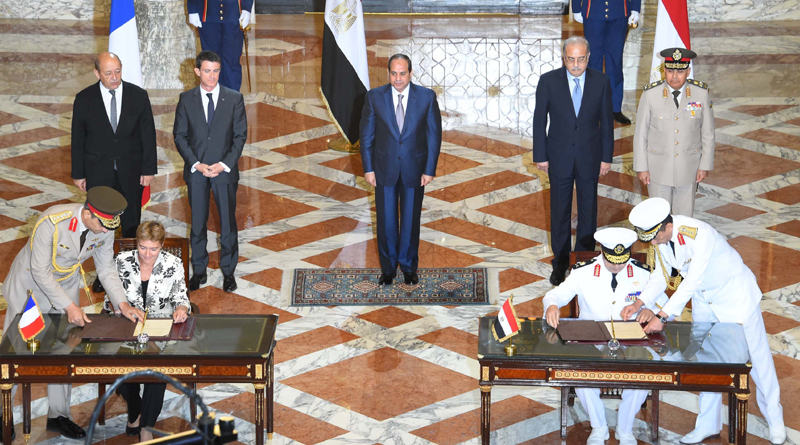by Maye Sadek
Continuing its effort to diversify its sources of armament, Egypt signed an agreement with France to purchase two Mistral helicopter carriers for 950 million Euros ($1.06 billion).
The ships should be handed over in early March after the training of about 400 Egyptians in France, which is included in the value of the deal.
Official sources in France said that Saudi Arabia will finance a considerable part of this deal, according to the French magazine Express. It also said that Gulf countries helped Egypt in another deal that was held with France earlier this year.
Egypt acquired earlier this year a French frigate as part of a 5.2 billion euro contract for 24 Rafale warplanes, France’s first overseas export of the fighter jet.
The French government loaned Egypt 3.2 billion Euros to finance this purchase of French military equipment, Egypt’s President Abdel Fattah El-Sisi said in an interview.
France said at the time the deal was agreed upon that more than half the purchase price would be financed by French banks with a state-backed Coface guarantee.
Cairo has sought to boost its military power in the face of a two-year insurgency based in the Sinai Peninsula and fears the conflict in neighboring Libya could spill over. Egypt’s allies are also keen to burnish its image in a region beset by turmoil.
A diplomatic source said to Reuters that Cairo wanted to base one of the newly bought ships in the Mediterranean and another in the Red Sea, making it available for future operations in Yemen, where Egypt is part of a Saudi-led coalition fighting Houthi rebels.
Analysts have indicated the increasing number of Egypt’s armament deals with France represents a concrete step by the North African country to decrease its reliance on US defence capabilities. “The reality is that Egypt isn’t going to try to conquer Libya or Yemen,” AP quoted IHS Janes analyst Ben Moores as saying. “It’s not trying to change those countries. It’s just trying to keep a lid on them.”
With the Islamic State group assuming control of vast swathes of Iraq and Syria, Egypt has been beset by bombings and other terrorist attacks, and El-Sisi has made building up his country’s military a top priority, according to the International Business Times website.
Both ships that Egypt purchased were built for Russia in what would have been the first major arms deal between that country and a Western power since World War II. After Russia annexed Crimea and allegedly backed pro-Russian separatists in Ukraine, however, France scrapped the deal in late 2014. Since then, it has lost millions of dollars in upkeep costs while looking for a buyer.
Gulf states are also scrambling to buy the French Rafale fighter jet, and are signing defence contracts with Paris to express their discontent with American policies in the wake of the Iran nuclear negotiations. The fact that the Iran talks have excluded Gulf Cooperation Council (GCC) partners while ignoring Tehran’s regional meddling has led Gulf partners to question the American commitment to their security, especially after the administration’s backtracking on a Syrian chemical weapons red line. Spotting an opportunity, France has stepped in to fill the void.
France adopted a hard line from the beginning of the Iran nuclear talks to both distinguish itself from the United States and to cultivate closer ties with the Saudis and other nervous Gulf states. It continues to push for a UN Security Council resolution enforcing a two-state solution to the Israeli-Palestinian conflict, forcing the Obama administration to seek a postponement of any vote on the issue.
Presenting an alternative to the United States on such key regional issues has helped Paris put the Rafale on the map and secure billions in regional defence contracts over the past year, raising French arms exports to the highest level in 15 years, according to Politico.
In Egypt, France capitalized on the contentious US arms suspension that began in late 2013 to secure a Rafale deal in February, which came on the heels of the Egyptian navy’s purchase of four French corvettes last summer. Even though the United States ended the suspension earlier this year, France’s military deals are not tied to mutual security objectives and have no conditions requiring Cairo to undertake political reforms. As Egypt’s experience shows, France has emerged as an attractive, no-strings-attached alternative for states seeking to sidestep the scrutiny of US conditional aid.
Saudi Arabia, the Gulf’s geopolitical heavyweight and one of the United States’ most important regional partners, has also followed suit. Shortly before King Salman of Saudi Arabia skipped President Barack Obama’s Camp David meeting in May, he sent French President François Hollande a royal invitation to the GCC summit in Riyadh. As the first foreign leader to attend the summit, Hollande’s presence sent a stark signal to the United States that the GCC has another reliable partner in the West.
However, France will not supplant the United States as an alternative security guarantor for the Middle East. Despite recent instability in its regional relationships, the United States maintains a forward military presence no other country could sustain. And for all of their bluster, Gulf partners still rely on Washington’s superior capabilities and will to act. But until relations between the United States and its Middle Eastern partners stabilize, France is happy to present an outlet for regional actors to express their dissatisfaction in exchange for lucrative defence deals.
With the Rafale leading the charge, this new brand of economic diplomacy is allowing one of Europe’s major powers to amplify its influence in the Middle East and beyond. Through the Rafale, French influence is seeping into the political cracks and fissures of the United States’ Gulf partnerships.


